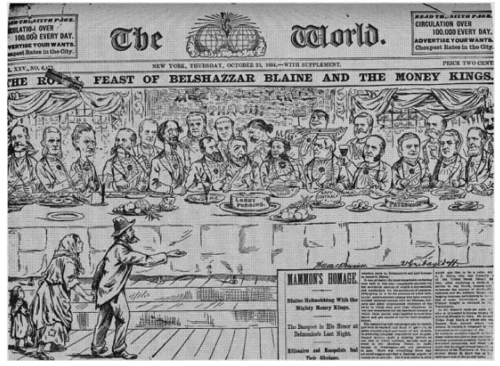Morning Must-Read: Justin Fox: America’s Long and Productive History of Class Warfare
Justin Fox: America’s Long and Productive History of Class Warfare: “Six days before the election, the Republican nominee for president attended a fund-raising dinner at a posh New York restaurant.
Two-hundred of the country’s richest and most powerful men were on hand. The next day, they were confronted with this… drawing… in the now-defunct New York World on Oct. 30, 1884. The candidate was James G. Blaine (the droopy-eyed fellow in the center of the picture who is about to dig in to some Lobby Pudding), and the man who subjected him to this harsh treatment was Joseph Pulitzer….
The cartoon that Pulitzer had Walt McDougall and Valerian Gribayedoff draw was just the beginning — although what a beginning it was…. The World revealed every aspect of the dinner, even though the organizers had done their best to bar the press. From the Timbales à la Reine and Soufflés aux Marrons upon which the men feasted to the thousands of dollars pledged to buy votes, no detail was left out. Even more damning, the main story began with a one-paragraph account of men who had been thrown out of work at a mill in Blaine’s home state and were now applying for assistance or emigrating to Canada….
It wasn’t just that, though. In an era when America’s first industrial magnates were amassing unheard-of riches and using it to mold the political system to their liking, resentment of that wealth and power was widespread. Pulitzer’s attacks on the rich helped bring in readers, so many that before long he too had become a multimillionaire with a yacht, a house not far from Vanderbilt’s on East 55th St. in Manhattan, and a membership in the Jekyll Island Club…. The ferociousness of his initial assaults, and of many others aimed at the tycoons who dominated the country’s late-19th-century Gilded Age, gives the lie to the complaint voiced these days in some circles that current resentment of the rich is somehow unprecedented or un-American — or even reminiscent of Nazi Germany.
Have these people never heard about Teddy Roosevelt excoriating the “malefactors of great wealth,” or his cousin Franklin getting Congress to raise the tax rate on top incomes past 90%? Americans have been pillorying the rich on and off for more than 200 years, and our economic system has survived and mostly thrived…. What’s been unique, or at least highly unusual, has been the environment in which entrepreneurs and business executives were able to operate from the late 1970s through the early 2000s. Taxes dropped, high-end incomes exploded, and hardly anybody complained at all.
Far from complaining, in fact, the news media for the most part celebrated the recipients of those exploding incomes for their boldness, creativity, and economic importance. It was a pretty stinking awesome time to be a plutocrat: You got to make billions of dollars, pay far less in taxes than you would have a quarter-century before, and get your face on the cover of Forbes or Fortune (or maybe even the top of your head on the cover of HBR)…. By the numbers it’s still a pretty awesome time to be a plutocrat, but clearly the mood has changed. It’s important to remember, though, that the anomaly is not the current mood of skepticism of business and the rich. It’s what preceded it.

